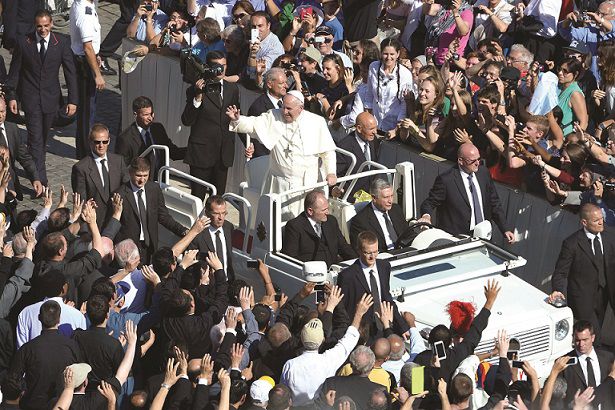In a lengthy interview with a Mexican multimedia group, Pope Francis hit on several topics, including his visit to the U.S., where he symbolically wanted to enter from the country’s border with Mexico.
When asked by journalist Valentina Alazraki why he chose not to go to Mexico as part of his trip to the U.S. in September, Francis said that “I thought about doing it, because I wanted to enter the United States from the Mexican border.
“But, if I was going to Ciudad Juarez, for example, and entered from there, or Morelia, and entered from there, there would be a bit of havoc: how can one go from there and not come to see the Se√±ora, the Mother!” he said, referring to Our Lady of Guadalupe.
Pope Francis said that if he went to Mexico he would have to visit the image, and explained that one can’t visit Mexico “just for a bit. Mexico requires a week.”
“So I promise a trip to Mexico as it deserves, and not to hurry and pass through. It’s because of this I decided not to go to Mexico.”
The pontiff also discussed immigration and the importance of the U.S.-Mexico border.
Not only do Mexican citizens cross the border, but also people coming from Central America and Guatemala, who he said cross all of Mexico “to look for a better future.”
Immigration today “is the fruit of unrest in the etymological sense of the word, a fruit of hunger, of the search for new frontiers,” he said.
Francis noted how immigrants leave their own countries often due to hunger, war or a lack of work, and said these things all find a common cause in the “tyranny of an economic system that has the god of money in the center and not the person.
“People are discarded. So a country creates ... an imposed economic situation ... which discards people, which makes them go to the other side to look for work, or food or well-being.”
The Pope noted how the U.S.-Mexican border is an area currently involved in “a great fight against drug trafficking.
“I don’t want to throw out statistics and then create a diplomatic problem for myself — but I’ve been told, and I saw it in a magazine, I think (the United States) are among the top drug consumers in the world and the border in which the drugs enter, the main one, is the Mexican (border),” he said.
Francis then pointed to the area of Morelia in Mexico, saying that it is one place particularly ravaged by drug trafficking organizations.
The traffickers, he said, “know how to carry out their work of death, they are messengers of death, whether it’s by drugs, or to ‘clean’ those who oppose drugs.”
He recalled the 43 students who were disappeared in Mexico last fall, and are presumed to have been killed by a drug gang after being handed over by corrupt police. The students, Francis said, are asking in for justice and to be remembered — not for revenge.
Pope Francis also referred to his recent elevation of Morelia’s archbishop, Alberto Suarez Inda, as cardinal in February.
One of the reasons for the appointment, he said, is because the cardinal — to use a colloqial expression — is “in the (frying) pan.
“In other words he’s a man that is in a very hot area and is a witness of a Christian man, of a great priest,” Francis said.
In the wide-ranging interview, he also discussed the Church in Latin America and the growth of evangelical communities; his pontificate and whether he likes being pope; the Roman Curia; the Synod on the Family; and the scourge of child sex abuse by clergy.

